The iPhone 5 Review
by Anand Lal Shimpi, Brian Klug & Vivek Gowri on October 16, 2012 11:33 AM EST- Posted in
- Smartphones
- Apple
- Mobile
- iPhone 5
General Purpose Performance
Section by Anand Shimpi
Apple's philosophy on increasing iPhone performance is sort of a mix between what Microsoft is doing with Windows Phone 7/8 and what the high-end Android smartphone makers have been doing. On the software side Apple does as much as possible to ensure its devices feel fast, although I notice a clear tendency for newer iOS releases to pretty much require the latest iPhone hardware in order to maintain that speedy feel over the long haul. When it comes to hardware, Apple behaves very much like a high-end Android smartphone vendor by putting the absolute fastest silicon on the market in each generation of iPhone. The main difference here is that Apple controls both the software stack and silicon, so it's able to deliver a fairly well bundled package each year. It's a costly operation to run, one that is enabled by Apple's very high profit margins. Ironically enough, if Apple's competitors would significantly undercut Apple (it doesn't cost $599 - $799 to build a modern smartphone) I don't know that the formula would be able to work for Apple in the long run (Apple needs high margins to pay for OS, software and silicon development, all of which are internalized by Apple and none of which burden most of its competitors).
Good cross platform benchmarks still don't really exist on smartphones these days. We're left describing experience with words and trying to quantify performance differences using web based benchmarks, neither of which is ideal but both of which will have to do for now. The iPhone 5 experience compared to the 4S is best explained as just being snappier. Apps launch faster, scrolling around iOS Maps is smoother, web pages take less time to load and the occasional CPU/ISP bound task (e.g. HDR image processing) is significantly quicker. If you're the type of person who appreciates improvements in response time, the iPhone 5 delivers.
How does it compare to the current crop of high-end Android smartphones? I would say that the 5 generally brings CPU performance up to par with the latest and greatest in the Android camp, and in some cases surprasses them slightly. It's difficult making cross platform comparisons because of huge differences in the OSes as well as separating out tasks that are CPU bound from those that simply benefit from a higher rendered frame rate.
I took a cross section of various web based benchmarks and looked at their performance to help quantify where the iPhone 5 stands in the world. First up are the RIABench focus tests, these are javascript benchmarks that focus on various compute bound tasks. I used Chrome for all Android devices to put their best foot forward.
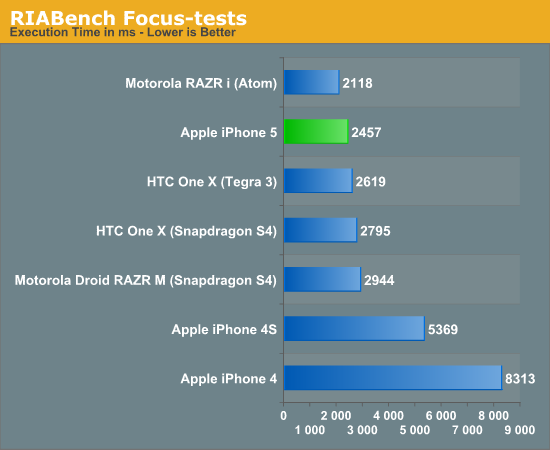
This first test shows just how slow the 800MHz Cortex A9s in the iPhone 4S were compared to the latest and greatest from Qualcomm and NVIDIA. At roughly half the clock speed of those competitors, the 4S was just much slower at compute bound tasks. Apple was able to mask as much of that as possible with smooth UI rendering performance, but there was obviously room for improvement. The iPhone 5 delivers just that. It modernizes the iPhone's performance and inches ahead of the Tegra 3/Snapdragon S4 platforms. Only Intel's Atom Z2460 in the Motorola RAZR i is able to outperform it.
Next up is Kraken, a seriously heavy javascript benchmark built by Mozilla. Kraken focuses on forward looking applications that are potentially too slow to run in modern browsers today. The result is much longer run times than anything we've seen thus far, and a very CPU heavy benchmark:
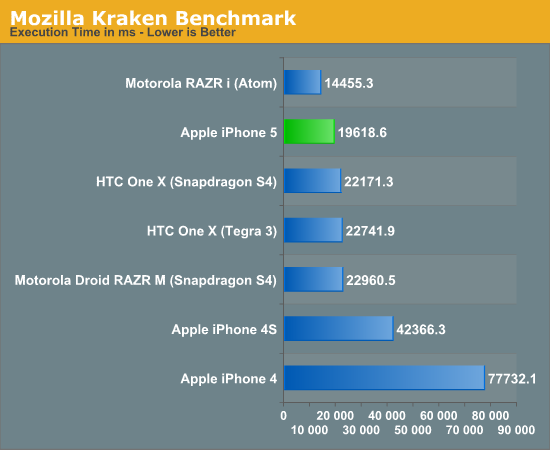
The standings don't change much here. The iPhone 4S is left in the dust by the iPhone 5, which steps ahead of the latest NVIDIA/Qualcomm based Android devices. The Apple advantage here is just over 10%. Once again, Intel's Atom Z2460 pulls ahead with the clear lead.
In our iPhone 5 Performance Preview we looked at Google's V8 javascript test as an alternative to SunSpider. The more data points the merrier:
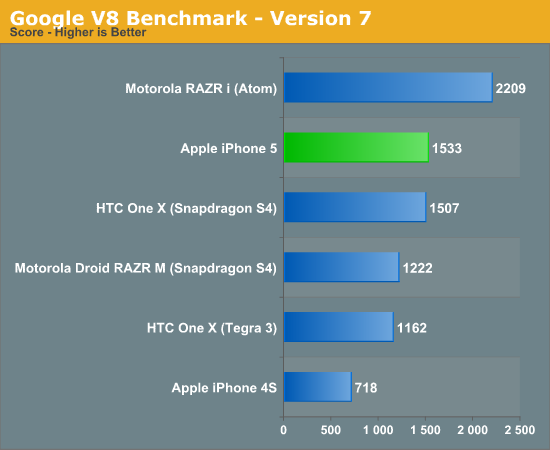
Here the iPhone 5 manages to hold onto its second place position, but just barely. Once more, the Atom based RAZR i maintains the performance lead.
Google's Octane benchmark includes all 8 of the V8 tests but adds 5 new ones including a PDF reader, 3D bullet physics engine and portable 3D game console emulator all built in javascript.
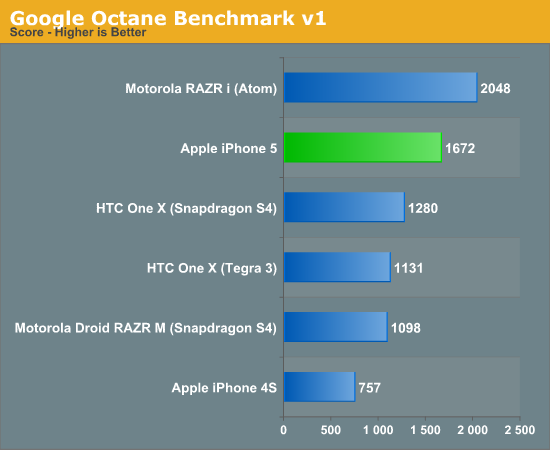
The 5 pulls ahead of the HTC One X here and maintains a healthy 31% lead, but once again falls short of the RAZR i.
We of course included our SunSpider and BrowserMark tests, both of which show the iPhone 5 very favorably:
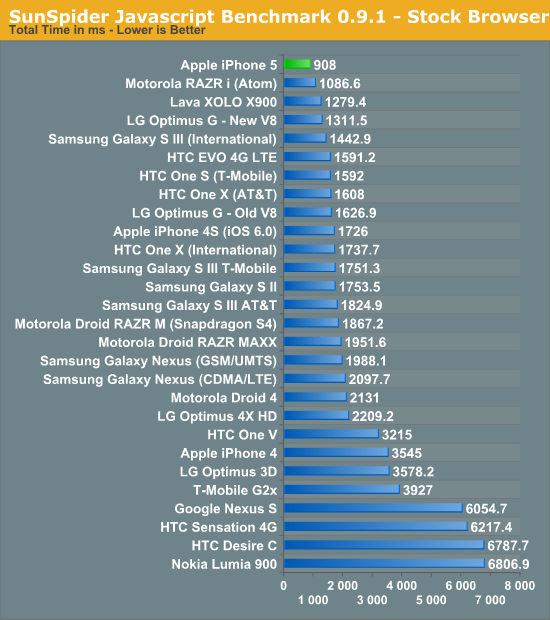
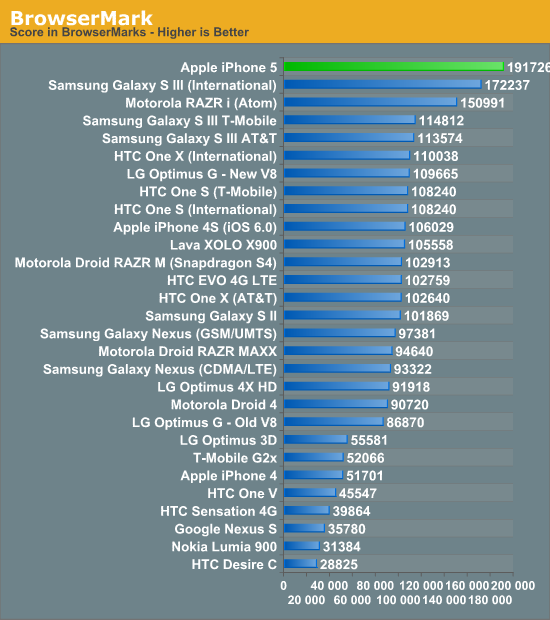
Performance obviously depends on workload, but it's clear the iPhone 5 is a big step forward from the 4S and tends to outperform the latest ARM based Android smartphones. As the rest of the ARM based SoC players move to Cortex A15 designs they should be able to deliver faster devices in the first half of 2013.
Intel's current position when it comes to CPU performance is interesting. A move to a dual-core design could be enough to remain performance competitive with 2013 ARM based SoCs. Remembering that Atom is a 5 year old CPU core that performs at the level of a 10 year old mainstream notebook CPU puts all of this progress in perspective. Intel's biggest issue going forward (other than getting Atom into more tier 1 phone designs) is going to be improving GPU performance. Luckily it seems as if it has the roadmap to do just that with the Atom Z2580.










276 Comments
View All Comments
Sufo - Tuesday, October 16, 2012 - link
Agreed. If his goal is to fly the flag for apple (who clearly need no flag flying - look at their stock prices, but i digress...), and discredit its detractors, he's doing an awful job. But then again, I do detect a whiff of troll.Spunjji - Friday, October 19, 2012 - link
Word.doobydoo - Saturday, October 20, 2012 - link
Bragging? About being an engineer?LOL
dagamer34 - Tuesday, October 16, 2012 - link
If you wanted a "should I upgrade to this phone" review, there are hundreds of those reviews online. But AnandTech is pretty much the only place where you get a definitive review worth reading 5 years from now. They leave no stone unturned.Arbee - Tuesday, October 16, 2012 - link
Agreed. "Should I upgrade" is covered by literally dozens of newspapers, TV shows, and websites (Engadget, The Verge, Gizmodo, All Things D just to name 4). AT is the home of the 15+ page deep dive, and they do it just as well for Androids and Windows Phones.Also, I'm completely positive that if you sent Brian a GS3 with the iPhone 5's camera he'd write about it in exactly the same way. 2 weeks ago DPReview covered the iPhone 5's camera in a very similar way (including the same suggestions on how to avoid the problem, and a demonstration of inducing similar artifacts on the iPhone 4S and a couple of Android handsets). Optics is not a soft science, there is no room for fanboyism.
rarson - Wednesday, October 17, 2012 - link
I totally disagree. He brings up a completely valid point because Anandtech usually separates the reviews from the in-depth tech examinations. There's absolutely no need for the review to be 20 pages when most people are looking for benchmarks and hands-on impressions. Considering the fact that going this in-depth made the review late, it makes no sense at all.At least half of this information in this article doesn't even fall under the category of a review.
darkcrayon - Tuesday, October 16, 2012 - link
I think this type of review (hell, the site in general) is directed at people that want the maximum amount of compiled nitty gritty techy details... Notice his review was weeks after the larger more general consumer oriented sites. I think anyone wanting to know whether they should upgrade, that isn't interested in the technical details of the A6, would be better served reading those reviews anyway.Anand has said in previous reviews that he felt that iOS was intended to be more of an "appliance" OS. It's a pretty apt comparison of the two actually. That focus is why you can side load and more easily put custom software on Android, and also why you'll need anti-malware software for it before long as well. The point of an appliance is to have a reliable, consistent device that you spend more time using than tweaking.
daar - Wednesday, October 17, 2012 - link
Point taken, darkcrayon.I prefer AT's reviews because they do a thorough and unbiased job at detailing/benchmarking and comparing different products. The suggestion was that the info about the SoC be split on it's own. If Intel released a new chip, call it i9, and the first sample was from an Alienware notebook, I would simply be suggesting that the technical info about the chip have it's own post and not be combined with the review of the notebook is all.
I find it a bit strange that people are suggesting to go to other websites when I made the comment of comparisons to other products, and quite unlike most posts in AT reviews. If I make a comment about a few ATI features not being compared with Nvidia's, I would have been surprised to have people to tell me to go visit Tom's Hardware or the like.
Not to say there wasn't any comparisons, but rather in contrast to say, for example, the One X review where Brian made the comment of how the construction of the device felt better than the GS3. It felt like punches were being pulled in this review is all.
phillyry - Sunday, October 21, 2012 - link
Anand,I would like to know, however, how an Android device serves more as an all purpose device than an iPhone.
Did you mean because of its customisable skins or because it can do some things that an iPhone cannot - presumably because of Apple's strong hold ('death grip') on the OS?
This is pretty important to me because I am near the end of the term of my agreement and am in the market for a new 'phone'. I've considered W8P for precisely this reason but am waiting to see if they flop or not. I've always thought of Android as pretty darn similar to iOS but with slightly different interfaces and less user restrictions.
Is there some other factor that makes an Android any more like a pocket computer, like the future x86 W8P phones will presumably eventually be, and less like an iPhone than I have imagined?
phillyry - Sunday, October 21, 2012 - link
I also took notice of it when Anand referred to the iPhone as an appliance. Your remark saying, "The point of an appliance is to have a reliable, consistent device that you spend more time using than tweaking" would be comforting but I don't think that that's quite how Anand meant it. I was actually quite put off by the term because I think that he meant that the iPhone is made to be more of a tag along device that goes with your other Macs and plays a support role rather than a stand alone device. He pretty much says as much.Like I said, I found this a bit off putting but I think he's just saying how he sees it in terms of the respective companies' product lines and agendas. It actually makes a fair bit of sense. I found that when I got an iPhone it made me want an iPad. And then when I got an iPad it made me want a MacBook. Call it what you will but I remember thinking that they should be able to make it so that I can do everything I need to on an iPad but distinctly felt like I really needed a MacBook to really do all that I wanted. It could be argued, along the lines of Anand's original comment, that this is Apple's approach / business model.
It also points to a distinction between Apple and the other big player that no one in this forum is talking about - Microsoft. Windows 8 appears to be meant to be the exact opposite of this approach. Instead of one device for each purpose it's one device for all purposes. It will be interesting to see if Microsoft's approach with Windows 8 will turn things around or simply flop, at least on the handheld device side of things.